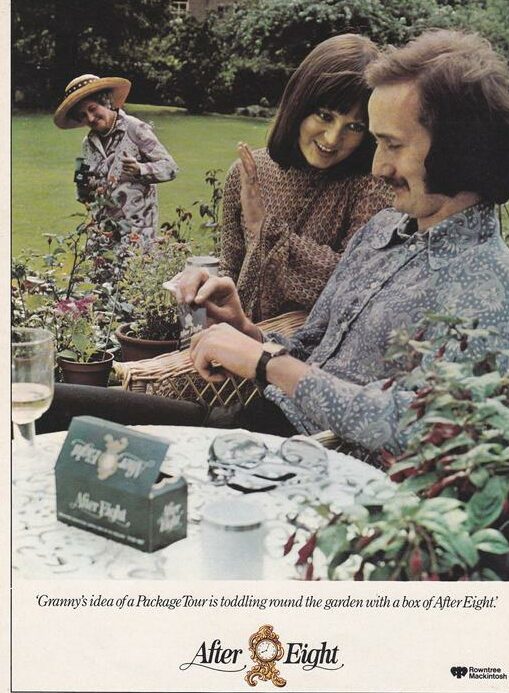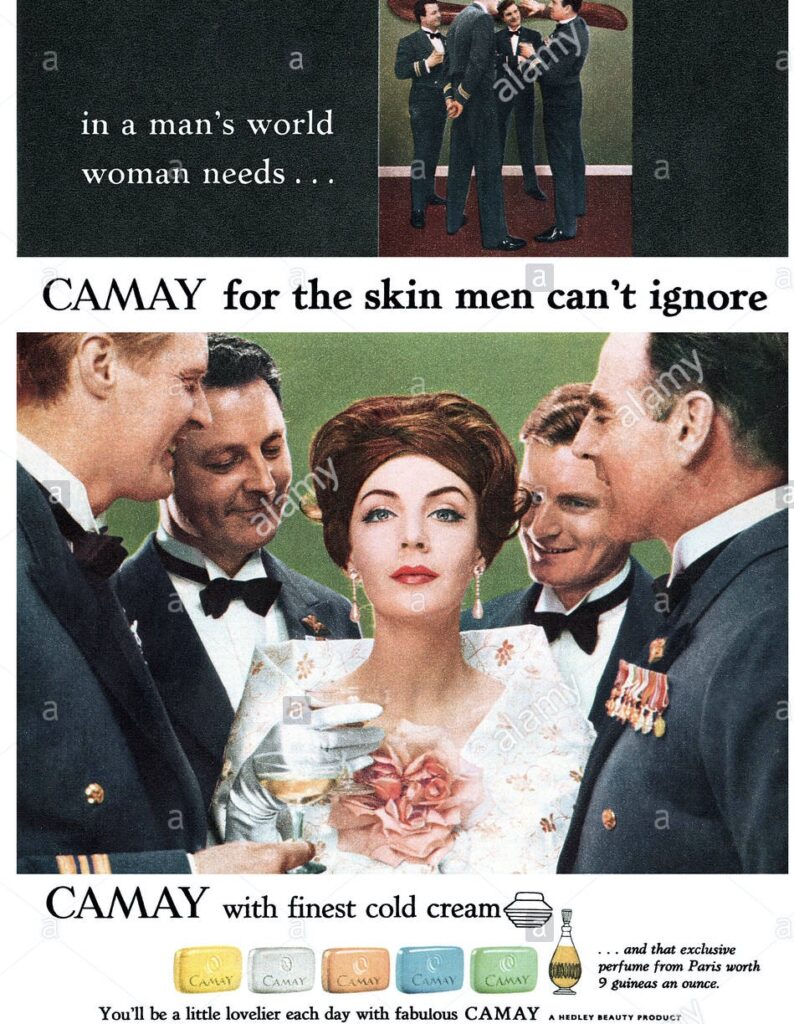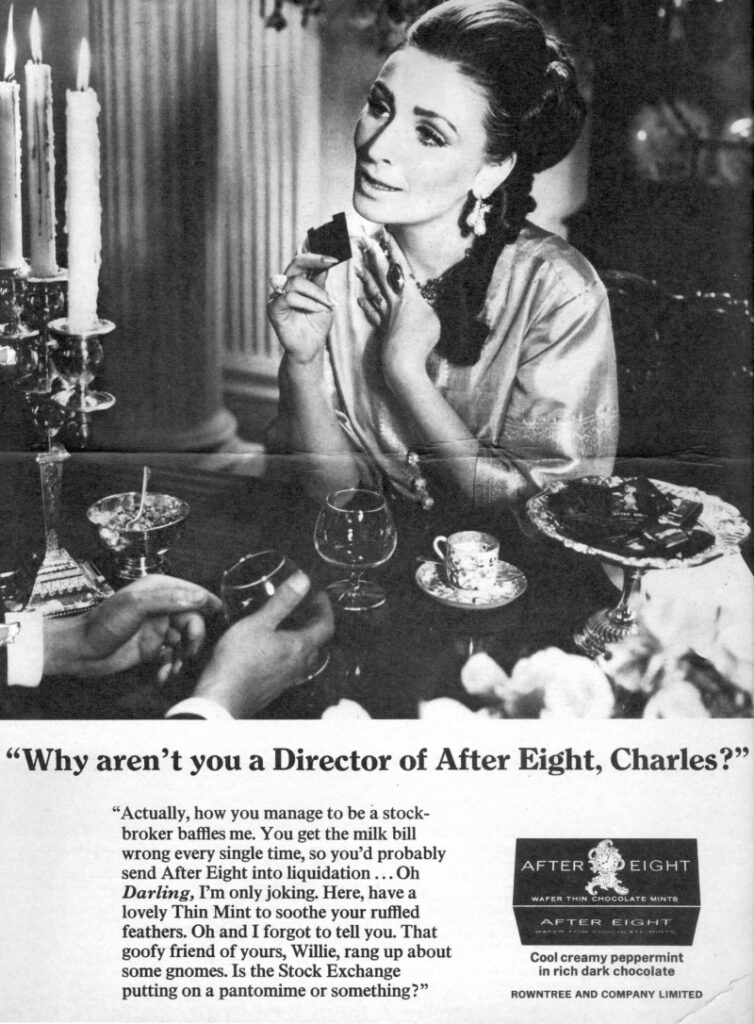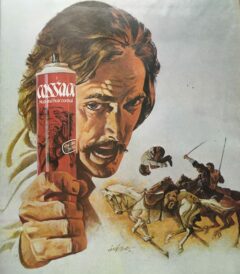
The sixties and seventies were certainly a time when advertisers thought that aspirational advertising was the way to the proletariat’s sweet-tooth, before the word ‘obesity’ even existed. In the case of Camay soap advertising, for example, it was about the elite educating the Great Unwashed in the importance of cleanliness. Convincing ordinary people that by buying a certain product, they were aspiring to be like the incredibly sophisticated, privileged individuals featured in their adverts, those people we looked up to and wanted to be like. Apparently. In fact, ordinary people really just wanted those privileged people’s money and live their life of leisure and social ease. But maybe buying After Eights was the first rung on that particular social ladder.

Let’s go back to a time when a 3 bob box of chocolates catapulted you into the giddy stratosphere of the upper classes. When, if you were not invited to black-tie dinner parties in the country, you were a fucking failure. If you didn’t drink ‘French’ brandy and smoke Havanas after a meal, you were scum. If you didn’t listen to the Admiral’s post-prandial stories you were a cretin of the first order. But here was a sliver of hope in the the shape of a wafer thin mint.
Recently in The Archers, that everyday story of country folk, Emma and Ed’s dream of having their own home was dashed after Ed lost his job due to some dodgy insecticide dealing. So far, so un-After Eight. As poor Emma sold off all the items she’d bought for her dream house, her mum, Susan, asked why she was getting rid of the lovely brandy glasses she’d bought. Emma confessed she’d bought them in the hope they could have invited friends round to their house for a dinner party and she would have served them brandy in the glasses after the meal (she didn’t mention After Eights as it happened). This was Emma’s After Eights’ aspirational fantasy. It’s what people who owned their own house did. Poor Emma was an After Eights’ advertiser’s core target audience.
It’s interesting that Emma mentioned brandy specifically as this was iconographic to After Eight ads. Of course, why wouldn’t it be as this was the moment the hostess unleashed the chocolates to her assembled group of upper class twats. The ads changed only subtly over the years but certain elements were always present. As well as ‘French’ brandy, cigars featured heavily with whiskered septuagenarians blowing acrid thick smoke into the faces of subservient younger women. Masculine or what? And, of course, coffee ‘as black as the night.’ Yet another symbol of utter sophistication, as only our betters drank black coffee in the 60s, for the rest of us it was Maxwell House or Nescafe with milk and sugar, if we drank coffee at all.
The slogan only changed once in 20 years. It started off as ‘Luxury. Plain, unashamed luxury.’ This word ‘luxury’ crops up rather often in these ads, verbally as well as visually. However, some advertising executive with an eye on the zeitgeist, at a time when the psychology of advertising was raising it’s ugly head in agencies, realised that the word ‘plain’ is the antithesis of the perception they wanted to convey with this product and the slogan was clipped to ‘Luxury. Unashamed luxury.’ It doesn’t quite scan as neatly but leaves the viewer in no doubt as to what this brand is all about. The idea of ‘luxury’ is piled on in spade-loads in the subsequent ads. The word ‘unashamed’ is also interesting. If ever a political point was being made in these ads, it was here.
The musical backdrop also changed rarely. Lush strings in the style of Mantovani accompanied the early versions. Clearly the target audience was the upwardly mobile twenty-somethings, those whose only ambition was to live a life like these fictional characters in the ads. This aural backdrop was eventually replaced by a slightly jazzier harpsichord soundtrack, in the hope of providing yet another layer of impossible sophistication. Come on, who doesn’t have an obsolete Elizabethan stringed instrument in their Drawer-ring Room?
The setting was also a construct made up of certain objects all of us could only dream of possessing. The cavernous dining room lit only by candles in silver candelabras, the shadowy oil paintings of crusty old mountebanks and popinjays on the walls, the elaborate arrangements of silver condiments (no HP sauce here), fruit bowls groaning with pineapples and grapes, very luxurious in those days, ordinary people only bought grapes when visiting someone in hospital, and solid silver coffee pots glinting in the candlelight.
In later versions directors tried to vary the setting a little while still ramping up the elements of exclusivity. Firstly, the dinner parties were moved to ‘the country’, that unspecified hinterland only the upper classes knew about and had ‘a place.’ In other words a massive pile which had been in the family for centuries, no doubt. This, ironically, was at a time when nobs were having to sell these out-of-town-in the-family-for-centuries residencies to hotel chains as they couldn’t afford to maintain them. The same group of chinless wonders are found sitting around drinking ‘French’ brandy and smoking cigars as their trophy wives looked on adoringly, but this time they were on ‘the terrace’ and there wasn’t a gust of wind or drop of precipitation to be had. What part of England were they in? Bangkok? A few years later they were ‘abroad’, ‘..since George was posted to the tropics..’, wherever ‘the tropics’ are? The hoi polloi wouldn’t know and would be too afraid to ask. Clearly George was sent to educate the natives in our British way of life which, of course, included After Eights, the symbol of manners and good taste. Hurrah for George!
The aristocratic- looking personnel for these ads was, literally, straight from central casting. All they had to do was look superior, smug and utterly obnoxious. The males had all the action: smoking cigars, drinking the ‘French’ brandy, looking like they were involved in earnest conversation with the other males (the women obviously didn’t get involved, but more about that later) and occasionally shooting some billiards, not snooker, that was a lower class pursuit. All the ladies had to do was look gorgeous and in awe of their men, nibble the corner of an After Eight seductively and swivel their eyes around the room. They knew their place.
But with only a few exceptions, it was always a woman who provided the voiceover, invariably the hostess. Domesticity was her role, but with the help of the servants, obviously. Can’t expect her to do everything!

Their language evoked a time that for 99% of the population, never existed. A world of tradition, convention and conservatism (with an upper and lower case’C’). Doesn’t everyone have dinner parties, you can imagine them wondering? They believed solidly in tradition, a word that is only used to justify something that is, otherwise, unjustifiable. ’I might be old-fashioned but I like leaving the men to drink their port…they pass the port and we pass the After Eights.’ And, let’s face it, women love their choccies. It’s fair to say After Eight ads hauled back the cause of women’s rights by 50 years.
With the advent of, what was referred to then as, ‘Women’s Lib’ in the 70s, (male) advertisers felt obliged to throw the women a few chocolatey crumbs and After Eight ads were no exception. Suddenly we had a male voiceover. Not a suspect male, or ‘girly-swot’ as Boris Johnson would call him, who organised and hosted dinner parties, mind you, but an Alpha male who talked gruffly about tradition rather than feminine observations on relationships. Interestingly, the narrative also changed significantly to reflect the challenging economic conditions of the austere early 70s. It begged the question, how could advertisers continue to push the winning aspirational After Eight formula in times of such hardship? Easy. Emphasise the luxurious element even more. And it is one of the male voiceovers that refers to this. ‘Luxury. We need a bit more of that nowadays.’ Even when the female voiceover returned (males probably not really aspirational enough to their female target audience), they referred to economic difficulties and spoke directly to the viewer. ‘Are you someone (like me) who prefers to forget about the Balance of Trade figures?’ Well she would say that wouldn’t she but she needn’t have worried her pretty little head. All she really had to concern her was whether cumquats were still in season or that the brandy was reliably ‘French’. Another ad featured a slightly younger male voiceover lamenting in a way only the public school classes with their arranged marriages could do. ‘If you’ve got to get married,‘ he splutters, find a girl who makes you laugh and is generous with the After Eights. Very generous..’ as he leeringly and lasciviously eyes a young woman done up like a trussed turkey, across the cavernous room. Yes, we know what you’re thinking you revolting beast! References to ‘thinness’ littered the ad, and he wasn’t just talking about the mints.
Before the male voiceover was finally put into its four-poster bed for good, we were given one last masterclass from that professional toff, Gerald Harper. His unmistakeable upper-crust tones gracing an early 70s version of the After Eight ad. Inevitable really as, at the time of broadcasting, he was Hadleigh, upper class adventurer going out on ITV on Friday nights at 9pm. The opening credits of this Harper-led vehicle featured him riding over his huge English estate on a thoroughbred stallion, driving around in his personalised number- plated Rolls, shooting grouse on his moor and hosting After Eight dinner parties at his family pile. (Might have made last bit up but plausible.) It was a gig written for the likes of him. Although he didn’t appear in the ad (too well known), his version was particularly elitist, even for After Eights. Men in black tie (obviously) playing billiards, women hanging around just looking languid. And, of course ‘French’ brandy. ‘My grandfather did not allow business to be discussed in the billiard room..’ as he looked up at an oil portrait of some whiskery old git. His disdainful pay off line pushing back the boundaries of sexism even for the 70s, ‘Even if it did mean letting the women in….’ Perish the thought.
Soon we were back to the tried, trusted and more lucrative female voiceover. Upper class men just weren’t sexy and sexiness was important to the brand. Women were, once again on safer ground, talking about Rupert and his head full of books, Great Uncle Alistair fighting the Battle of Waterloo with condiments, classical scholars like Uncle Bertie and the ghost of Henry, the Fourth Earl. At no point was there any suggestion that women might aspire to anything more than hosting parties, dealing with tradesmen, having their hair coiffed to within an inch of its life and taking elocution lessons. Their men were invariably much older, aloof and horribly ugly. No wonder some of the women’s eyes swivelled around the room as they comfort-ate boxes of After Eights, desperately looking for slightly more attractive and interesting male totty. You ain’t gonna find it in this ad, darling!
The production values were relatively lavish for commercials. As well as luxurious sets and moodily effective lighting, a host of quite well known actors, like Gerald Harper, popped up in them. All actors see adverts as artistically beneath them but these roles were money for old rope. Just look self-satisfied, snobbish and superior and Uncle Bertie’s your uncle!
Actors of high standing popped up in many of the ads throughout the 60s and 70s, adding a touch of class to scenes that were already improbably haute monde. The excellent and very lovely Adrienne Corri talked about great Uncle Alistair fighting the Battle of Waterloo from the opposite end of an overlong table. This woman worked with Kubrick in A Clockwork Orange for god’s sake! Also turning up ‘..in the tropics..’ was Alexandra Bastedo. Many a 70s teenage boy’s pin-up when she was Sharon McCreadie in The Champions’. Despite the fact I found her a bit too sweet to be wholesome, she carries off the role of colonial trophy wife, black servant in tow, with aplomb, and, not to mention, a curiously non-melting After Eight. And isn’t that the gorgeously moon-faced Patricia Hodge (who even does the voiceover), the Portia of Horace Rumpole’s chambers, planning yet another dinner party with lashings of After Eights? It surely is! Going back even further here’s the lovely Wanda Ventham of The Lotus Eaters and, once again, Rumpole of the Bailey, looking longingly at her dull, sweaty, overweight, tuxedoed ‘French’ brandy-quaffing husband as she wolfs into yet more wafer thin mints.
I am completely aware that having a pop at these adverts is tantamount to throwing a dart at a board as huge as an After Eight ad’s dining room wall. Hitting the target isn’t difficult. But this ad campaign lasted for over 20 years and I don’t remember anyone commenting on the sheer crassness and elitism they conveyed for so long. Didn’t people get pissed off at the utter snobbery of them? Advertisers would claim they were just a bit of fun, tongue-in-cheek. As the lady says, people like a bit of luxury. But I failed to see the irony in the ads. They were quite baldly saying , ‘These people are what you should be aspiring to, this is the way decent people live and by purchasing these bon-bons you can, at least, emulate a tiny part of their lives.’ Poor Emma wouldn’t see through the insidious context of these campaigns but I like to think we’ve matured as a viewing public these days and we’re not taken in by such elitist crap. They wouldn’t get away with it today, other than in an ironic way. Mind you, many people vote for Boris Johnson and Jacob Rees-Mogg, men you would not be surprised to see in one of those ads, although Boris would be dribbling his ‘French’ brandy down the front of his already stained black tie and leaving chocolatey smears on his unironed, slightly off-white shirt (maybe his wife/partner should use Daz?).
In a comment left on Youtube after viewing this 20 year campaign, the estimable Mike Smith summed up over 20 years of After Eight advertising in a single haiku-esque, wafer-thin comment.
‘The chocolates for
Seventies toffs, now they
Sell them in Poundland.’
How’s that for sophistication?
